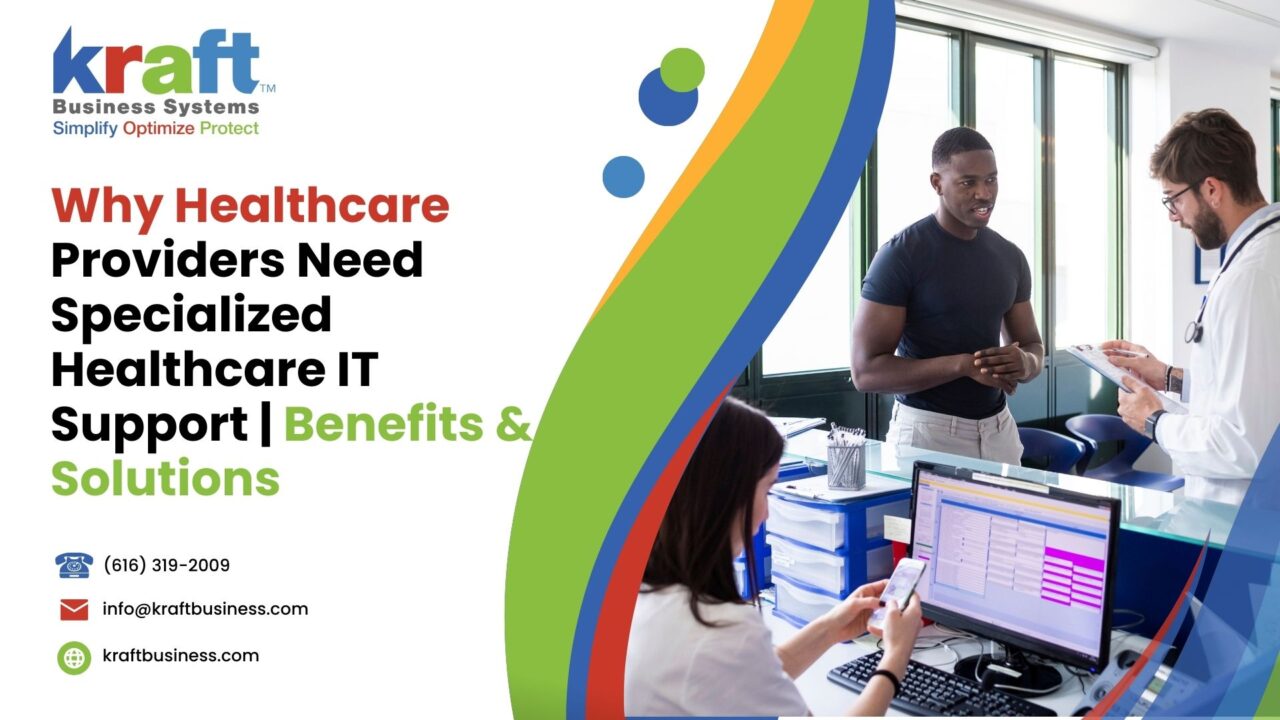As healthcare organizations navigate the complex landscape of patient care and regulatory compliance, the role of healthcare IT support becomes a critical element in their success. With advancements in healthcare technology, top companies are now leveraging specialized healthcare IT support to enhance the efficiency of their operations, secure sensitive data, and ensure uninterrupted patient care. In this context, support specialists and technicians have a vital role in keeping healthcare systems functional, secure, and aligned with industry regulations.
One of the most significant factors that healthcare providers need to consider is understanding the unique challenges associated with managing healthcare data, maintaining compliance, and integrating technology solutions like cloud migration. Healthcare IT support specialists and technicians help organizations navigate these complexities by providing targeted solutions that align with the needs of healthcare professionals and patients alike.
Why Healthcare IT Support is Essential for the Healthcare Industry
Healthcare IT Support and Its Role in Managing Complex Healthcare Systems
Healthcare IT support is not just about troubleshooting—it’s a comprehensive approach that ensures all technology within a healthcare organization is optimized, compliant, and ready to support critical healthcare services. From maintaining electronic health records (EHR) to managing patient care systems, healthcare IT support is integral to the day-to-day functioning of a healthcare setting. Support specialists, with their subject-matter expertise, play a key role in resolving issues, managing data, and ensuring seamless technology integration.

The healthcare industry faces unique challenges when it comes to IT support. For example, managing patient care data in compliance with HIPAA regulations requires a deep understanding of healthcare informatics and data security. Moreover, healthcare IT support professionals must handle a variety of medical devices and software used across different healthcare settings, from emergency rooms to ambulatory surgical centers. Their ability to understand the specific needs of healthcare providers and deliver tailored solutions is what sets healthcare IT support apart from standard IT services.
The Job Description of a Healthcare IT Support Specialist
The job description of a healthcare IT support specialist typically includes responsibilities like troubleshooting technical issues, managing EHR systems, ensuring data security, and supporting healthcare professionals in using healthcare technology effectively. They are also involved in regular IT audits to identify potential vulnerabilities in healthcare systems and implement strategies to mitigate risks.
A healthcare IT support specialist must possess problem-solving skills, knowledge of healthcare informatics, and a solid understanding of the healthcare industry. Their role is often complex, involving direct interaction with end-users, including healthcare professionals, to ensure they can use the technology tools necessary for delivering top-notch patient care. This critical role often extends beyond basic support to include advisory services on technology upgrades and compliance strategies.
Key Components of Healthcare IT Support Services
Technical Support and Help Desk for Healthcare Providers
Healthcare support involves more than just resolving issues—it includes providing a robust help desk service that is available 24/7 to address any technical disruptions that may occur. A healthcare IT support specialist is responsible for troubleshooting problems quickly and efficiently, whether it’s a minor issue like a software update or a major system outage that could impact patient care. The ability to offer quick resolutions ensures that healthcare providers can maintain their focus on delivering quality patient care without technical interruptions.
Help desk services in healthcare settings are designed to support healthcare professionals in navigating complex healthcare technology. This includes assistance with using EHR systems, managing patient portals, and troubleshooting network issues in real-time. Effective technical support minimizes downtime and enhances the overall functionality of healthcare operations.
EHR Management and Compliance in Healthcare Organizations
One of the primary responsibilities of healthcare IT support is the management of EHR systems. EHRs are a cornerstone of modern healthcare as they store comprehensive patient data, streamline clinical workflows, and support effective communication among healthcare providers. Managing these records requires healthcare IT support specialists to ensure that all data is accurate, secure, and accessible only to authorized personnel.
Compliance is another significant component of EHR management. Healthcare organizations must adhere to HIPAA regulations, which govern the protection and confidentiality of patient data. Healthcare IT support ensures that all systems handling patient information are compliant, and any potential breaches are swiftly addressed. This aspect of healthcare IT support is crucial in maintaining the trust and confidence of both patients and healthcare professionals.
Advanced Technologies and Healthcare IT Support
Cloud Migration: Benefits and Challenges in the Healthcare Industry
The migration of healthcare data to cloud platforms has become a standard practice for many healthcare organizations seeking to enhance data accessibility, scalability, and security. Cloud migration allows healthcare providers to store large volumes of data securely while enabling authorized personnel to access it from any location. This flexibility is particularly valuable in settings that use telemedicine and virtual care solutions, as it supports the seamless exchange of information between healthcare providers and patients.

However, cloud migration also comes with its own set of challenges. Healthcare IT support specialists play a critical role in ensuring that the migration process is smooth, secure, and compliant with regulatory standards. They must evaluate cloud solutions based on factors like encryption, access control, and data redundancy to ensure that the chosen platform aligns with the organization’s needs.
Healthcare Informatics and Its Impact on Patient Care
Healthcare informatics involves the application of data analytics to improve patient outcomes, optimize clinical processes, and support evidence-based decision-making. IT support specialists with expertise in healthcare informatics can help healthcare organizations leverage data effectively to enhance patient care. By analyzing trends and patterns in patient data, healthcare IT support teams can identify areas for improvement and implement targeted strategies that result in better patient care.
In addition, healthcare informatics supports the efficient management of healthcare operations, such as order entry and scheduling. Support specialists work closely with healthcare professionals to integrate informatics tools into everyday workflows, ensuring that these solutions are user-friendly and contribute to the overall efficiency of the healthcare setting.
Choosing the Right Healthcare IT Support Partner
What to Look for in a Healthcare IT Support Agreement
When selecting a healthcare IT support provider, healthcare organizations should evaluate potential partners based on their experience in the healthcare industry and their familiarity with healthcare-specific regulations like HIPAA. The support team should have subject-matter expertise in managing EHR systems, securing healthcare data, and providing comprehensive support for medical devices.

It is essential to review the details of the support agreement, including the scope of services, maintenance provisions, and end-of-lease options if the organization is considering a lease for its IT infrastructure. Some providers also offer managed print services, which can further optimize document management and reduce costs.
Managed Print Services and Healthcare IT Support
Managed print services are a specialized offering within healthcare IT support that focuses on optimizing print infrastructure and document workflows. In healthcare settings, where the volume of printed documents can be substantial, managing print resources efficiently is crucial. Healthcare IT support specialists can implement print management solutions that reduce waste, enhance document security, and streamline printing processes.
Managed print services are especially beneficial for medium and large healthcare organizations that require robust document handling capabilities. By integrating these services into their overall IT support strategy, healthcare organizations can achieve greater operational efficiency and cost savings.
Frequently Asked Questions (FAQs) About Healthcare IT Support
What Does a Healthcare IT Support Specialist Do?
A healthcare IT support specialist plays a critical role in maintaining and troubleshooting IT systems in various care settings, including skilled nursing facilities, virtual care settings, and more. Their job description often includes managing health information technology, supporting patients or caregivers, and providing help desk assistance to healthcare clients. As end-user computer support specialists, they ensure that all technology tools, from EHR systems to medical devices, operate seamlessly. You’ll be introduced to complex health systems and gain hands-on experience in dealing with compliance issues like HIPAA regulations and ransomware threats. This job is perfect for those seeking a foot in the door in the world of health IT, providing a foundation to advance your career.
How Does Healthcare IT Support Impact Patient Care?
Effective healthcare IT support has a direct impact on patient care by ensuring all systems in a healthcare organization function optimally. From managing patient portals to supporting physical therapists and caregivers with non-clinical technology, IT support specialists enhance the pace and rhythm of healthcare delivery. They play a crucial role in high reliability organizations, where the need for error-free performance is paramount. Whether you dream of working in emergency rooms or ambulatory surgical centers, IT support ensures a reliable infrastructure that supports virtual care settings and physical facilities alike, thus enhancing patient safety and care outcomes.
What Are the Challenges of Healthcare IT Support?
Healthcare IT support faces several challenges, such as maintaining compliance with stringent HIPAA regulations, securing healthcare data, and managing complex EHR systems. Additionally, healthcare settings are unique and require specialized support that addresses the intricacies of working with medical devices and diverse care settings. The rapid evolution of technology in healthcare also means that professionals must stay updated on the latest tools and trends, such as cloud solutions and ransomware prevention. Despite these challenges, the role is rewarding and essential for any healthcare help desk professional looking to make an impact in a growing field.
How Can Healthcare IT Support Help with Cloud Migration?
Healthcare IT support can play a pivotal role in guiding health systems through cloud migration. Select learning programs in IT support often focus on training professionals to handle these transitions smoothly. They’ll talk to technology partners to ensure that the migration process maintains data security, meets compliance requirements, and optimizes workflows. With unlimited access to cloud data, healthcare clients can leverage new technologies to provide world-class patient care. You’ll even find that cloud migration enables healthcare organizations to implement job-ready certificate programs for staff and introduce hands-on projects for IT teams, furthering their knowledge in this specific focus area.
How Do I Choose the Right Healthcare IT Support Partner?
When selecting a healthcare IT support partner, look for a provider with subject-matter expertise in health information technology and a proven track record with healthcare clients. People choose Coursera and similar platforms to gain insight into industry best practices. Consider partners who can support learning program selection and provide job-ready certificate programs for your team’s growth. We’re thrilled to see healthcare providers investing in IT solutions that support world-class courses and course materials for free for their teams. When choosing a partner, focus on those who offer comprehensive support, from HIPAA compliance to secure cloud migration, and can help you advance your career in this growing field.
How Can I Get Started in Healthcare IT Support?
If you’re considering a career in healthcare IT support, the best place to start is by exploring introductory courses that focus on health information technology and data security. Platforms like Coursera and others provide world-class courses where you can earn a certificate and gain job-ready skills. Apply for financial aid if needed, as many programs are designed to pique your interest and offer course materials for free. Whether you’re entering the field through a university that doesn’t offer specialized healthcare IT courses or seeking to advance your career as an allied health professional, enrolling in a job-ready certificate program will help you build the necessary foundation. Enroll for free to gain unlimited access to the latest training in healthcare IT support and learn from stories of inspiration shared by industry leaders.
What Are the Benefits of Gaining Healthcare IT Support Training?
Training in healthcare IT support is ideal if you want to get your foot in the door of a growing field with immense potential. Whether working as an analyst, a support specialist, or a healthcare help desk technician, gaining certification from world-class programs will allow you to specialize in areas like healthcare informatics, cloud migration, and data security. You’ll be introduced to the specific focus areas needed to thrive in the world of health IT and be well-prepared for roles in high-demand care settings. Completing training will not only enhance your problem-solving skills but also offer you details to know about current challenges and words of advice from experts in the field.
Healthcare IT support is a vital component of the healthcare industry, providing essential services that enable healthcare organizations to deliver high-quality patient care. From managing complex EHR systems to ensuring data security and supporting cloud migration, healthcare IT support specialists and technicians play a critical role in maintaining the functionality and compliance of healthcare technology. As healthcare continues to evolve, partnering with the right healthcare IT support provider will be key to achieving operational excellence and improving patient outcomes.






